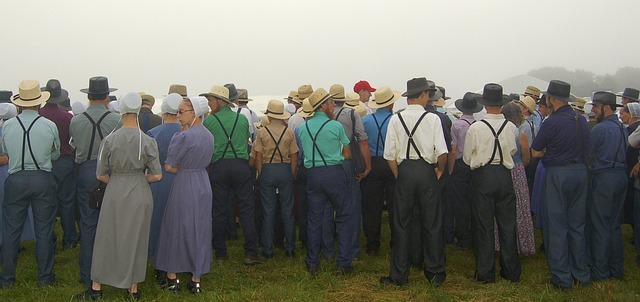The Amish are not Jewish. The Amish are a Christian religious group that originated in Europe and later settled in North America. They follow a distinct set of beliefs and practices that differ from Judaism.
Table of Contents
The History and Origins of the Amish Community
Have you ever wondered about the origins of the Amish community? Many people are curious about their unique way of life and their distinct customs and traditions. One question that often comes up is whether the Amish are Jewish. In order to understand the answer to this question, it is important to delve into the history and origins of the Amish community.
The Amish community traces its roots back to the 16th century in Switzerland. They are a group of Christian Anabaptists who believe in living a simple and humble life, separate from the modern world. The Amish are known for their traditional dress, horse-drawn buggies, and rejection of modern technology. But how does this relate to Judaism?
Contrary to popular belief, the Amish are not Jewish. While they share some similarities in their religious practices, such as the importance of community and the observance of strict religious laws, the Amish and Jewish communities have distinct origins and beliefs. The Amish are a Christian sect, while Judaism is one of the oldest monotheistic religions in the world.
The Amish community originated from a group of Swiss Anabaptists who broke away from the state church in the 16th century. They faced persecution and sought refuge in various European countries, including Germany and the Netherlands. Eventually, a group of Amish immigrants settled in Pennsylvania in the 18th century, where they established their own communities and continued to practice their unique way of life.
On the other hand, Judaism has its roots in ancient Israel and dates back thousands of years. It is based on the teachings and laws found in the Torah, the sacred text of Judaism. Jewish people believe in one God and follow a set of religious laws known as the mitzvot. Judaism has a rich history and has given rise to various traditions and customs that are observed by Jewish communities around the world.
While the Amish and Jewish communities have different origins, it is interesting to note that they both place a strong emphasis on community and family. Both communities value the importance of close-knit relationships and support within their respective communities. This shared value may be one reason why some people mistakenly believe that the Amish are Jewish.
In conclusion, the Amish community is not Jewish. While they share some similarities in their religious practices and values, the Amish and Jewish communities have distinct origins and beliefs. The Amish are a Christian sect that originated in Switzerland and settled in Pennsylvania, while Judaism is one of the oldest monotheistic religions in the world with its roots in ancient Israel. It is important to understand and respect the unique traditions and beliefs of different communities, including the Amish and Jewish communities, in order to foster understanding and appreciation for diversity.
A Comparison of Amish and Jewish Traditions and Beliefs

Are Amish Jewish? It’s a question that may have crossed your mind at some point. After all, both the Amish and Jewish communities are known for their strong religious beliefs and distinctive cultural practices. In this article, we will explore the similarities and differences between these two groups, shedding light on their traditions and beliefs.
Let’s start by looking at the Amish community. The Amish are a group of Christian individuals who follow a strict interpretation of the Bible. They believe in living a simple and humble life, free from modern conveniences and technology. The Amish value community and prioritize the needs of the group over individual desires. They are known for their distinctive clothing, which reflects their commitment to modesty and simplicity.
On the other hand, the Jewish community is one of the oldest religious groups in the world. Judaism is based on the teachings of the Torah, the sacred text of the Jewish people. Like the Amish, Jews also place a strong emphasis on community and family. They have a rich cultural heritage and observe a wide range of religious rituals and traditions. One of the most well-known Jewish practices is the observance of the Sabbath, a day of rest and worship that begins at sundown on Friday and ends at sundown on Saturday.
While there are certainly similarities between the Amish and Jewish communities, there are also significant differences. One of the key distinctions lies in their religious beliefs. The Amish are Christians, while Jews follow the teachings of Judaism. The Amish believe in salvation through faith in Jesus Christ, while Jews do not accept Jesus as the Messiah.
Another difference is the level of strictness in their adherence to religious practices. The Amish have a highly regulated lifestyle, with rules and guidelines governing every aspect of their lives. They live in close-knit communities and often marry within their own group. In contrast, Judaism allows for a greater degree of individual interpretation and flexibility in religious observance. Jews can choose to follow different branches of Judaism, each with its own set of customs and traditions.
Despite these differences, both the Amish and Jewish communities share a deep commitment to their faith and a desire to live according to their religious principles. Both groups value family, community, and the importance of passing down traditions from one generation to the next. They also face similar challenges in a rapidly changing world, as they strive to preserve their cultural heritage while adapting to modern society.
In conclusion, while the Amish and Jewish communities have distinct beliefs and practices, they also share common values and a strong sense of identity. Both groups are known for their commitment to their faith and their dedication to living according to their religious principles. So, are Amish Jewish? No, they are not. But they do share some similarities and can learn from each other’s traditions and beliefs.
Exploring the Similarities and Differences in Amish and Jewish Practices
Are Amish Jewish?
When it comes to religious practices, there are many different traditions and beliefs that people follow. Two groups that often come to mind are the Amish and the Jewish community. While they may seem similar in some ways, they are actually quite different. In this article, we will explore the similarities and differences in Amish and Jewish practices.
Let’s start by looking at the Amish community. The Amish are a group of Christian individuals who live a simple and traditional lifestyle. They believe in living separate from the modern world and strive to maintain a strong sense of community. One of the most distinctive aspects of Amish life is their rejection of modern technology. They do not use electricity, drive cars, or have televisions. Instead, they rely on horse-drawn buggies and oil lamps for transportation and lighting.
In contrast, the Jewish community is a religious group that follows the teachings of the Torah, the sacred text of Judaism. Judaism is one of the oldest religions in the world and has a rich history and tradition. Jewish people believe in one God and follow a set of religious laws known as the mitzvot. These laws cover a wide range of topics, including dietary restrictions, prayer rituals, and ethical behavior.
While both the Amish and Jewish communities have a strong sense of religious identity, there are some key differences in their practices. For example, the Amish place a strong emphasis on simplicity and humility. They dress in plain clothing and avoid any form of ostentation. In contrast, Jewish people often wear traditional clothing for religious ceremonies, such as the tallit, a prayer shawl, and the kippah, a skullcap.
Another difference lies in their approach to education. The Amish prioritize practical skills and believe that formal education beyond the eighth grade is unnecessary. Instead, they focus on teaching their children the skills needed for their traditional way of life. On the other hand, education is highly valued in the Jewish community. Jewish children attend religious schools, known as yeshivas, where they study Hebrew, the Torah, and other religious texts.
Despite these differences, there are also some similarities between the Amish and Jewish communities. Both groups place a strong emphasis on family and community. They believe in the importance of supporting and caring for one another. Additionally, both the Amish and Jewish communities have a deep respect for their elders and value their wisdom and experience.
In conclusion, while the Amish and Jewish communities may seem similar on the surface, they have distinct differences in their religious practices. The Amish follow a Christian tradition and prioritize simplicity and community, while the Jewish community follows the teachings of Judaism and places importance on education and religious laws. However, both groups share a strong sense of family and community, highlighting the universal values that connect us all.
Debunking Common Misconceptions about the Amish and Jewish Communities
Are Amish Jewish?
When it comes to the Amish and Jewish communities, there are many misconceptions that often arise. One of the most common misconceptions is that the Amish are Jewish. However, this is simply not true. While both communities have their own unique customs and traditions, they are distinct from one another.
To understand why this misconception exists, it’s important to delve into the history of both the Amish and Jewish communities. The Amish are a Christian religious group that originated in Europe in the 16th century. They are known for their simple way of life, which includes living without modern technology and dressing in traditional clothing. On the other hand, the Jewish community is an ancient religious and ethnic group that traces its roots back thousands of years to the Middle East.
One reason why people may confuse the Amish with being Jewish is their shared emphasis on tradition and religious observance. Both communities place a strong emphasis on maintaining their cultural heritage and adhering to religious practices. However, the Amish follow the teachings of Jesus Christ, while the Jewish community follows the teachings of the Torah and other sacred texts.
Another reason for the confusion may be the physical appearance of some Amish individuals. The Amish often wear traditional clothing, including long dresses and bonnets for women, and beards and hats for men. This distinctive attire can sometimes be mistaken for traditional Jewish clothing, such as the yarmulke or the tzitzit. However, it’s important to remember that clothing is just one aspect of a person’s identity and does not determine their religious affiliation.
Furthermore, the Amish and Jewish communities have different origins and historical experiences. The Amish trace their roots back to the Anabaptist movement in Europe, which faced persecution and sought religious freedom. In contrast, the Jewish community has a long history of persecution and exile, including the Holocaust. These distinct histories have shaped the cultures and practices of both communities in unique ways.
It’s also worth noting that the Amish and Jewish communities have different beliefs and practices when it comes to faith and spirituality. The Amish believe in the importance of community and living a simple, humble life. They prioritize family, hard work, and self-sufficiency. In contrast, the Jewish community has a rich and diverse set of beliefs and practices, including the observance of holidays, rituals, and dietary laws.
In conclusion, while the Amish and Jewish communities share some similarities, they are distinct from one another. The misconception that the Amish are Jewish stems from a lack of understanding about the history, beliefs, and practices of both communities. It’s important to approach these misconceptions with an open mind and a willingness to learn about different cultures and religions. By doing so, we can foster greater understanding and appreciation for the diversity that exists in our world.
Conclusion
No, the Amish are not Jewish.
For licensing reasons, we must provide the following notice: This content was created in part with the help of an AI.


